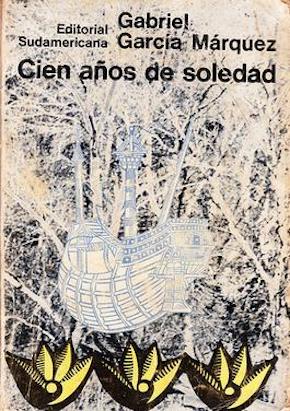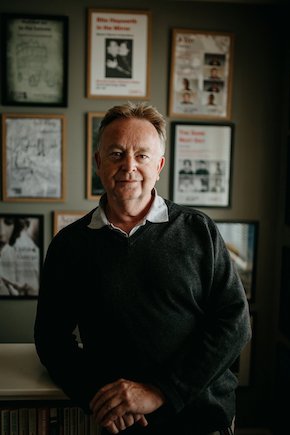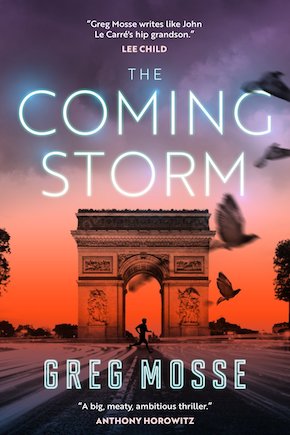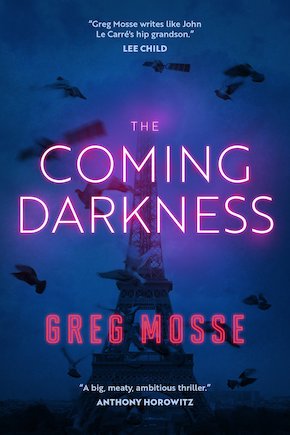Debts I owe to books
by Greg MosseI owe a lot to books. Some have been my teachers, others my emotional and psychological mentors, many my companions in escapism. Quite a few have been money-earners, friend-bringers, pain-resolvers, eye-openers. This is a brief survey of my top ten debts and to which special volumes I owe them.
I almost died of pneumonia when I was small. After many weeks of forced immobility, the doctor finally said I could sit up and read. My grandmother gave me a copy of James & the Giant Peach. With my fever not quite abated, all the extraordinary events seemed terribly possible. It was the first proper novel I’d ever read – a complete world made of words. I owe it my awakening to literature.
When I was ten or eleven years old, I picked up a tattered copy of The Legion of the Damned by Sven Hassel in a jumble sale. It’s a novel about miserable infantrymen in the German army in World War II, allegedly based on the author’s own lived experience. Later, I discovered it was all made up but, at the time, it taught me about how compelling it is to see characters suffer.
A few years later, at fourteen, I took – from a mouldy bookshelf in our depressingly cold cottage in a damp village in southwest Sussex – a Reader’s Digest Condensed Books volume containing a chopped down version of Clutch of Constables by Ngaio Marsh. It was the first time I’d ever read a story that was as much logic-puzzle as character study, igniting my love of classical whodunnits.
Not really knowing what I was getting myself into, at another jumble sale, I picked up a copy of The Fellowship of the Ring by JRR Tolkien (just volume one, not the whole Lord of the Rings trilogy). To the immense and sprawling world therein – sprawling across time as well as geography – I owe my first understanding of speculative writing, imagined worlds, other realms.
I read One Hundred Years of Solitude in a mediocre American-English translation. Finally I was able to read it in the original Spanish. I owe this book the confirmation of a lifelong love of languages.”
At the other end of the scale entirely, I was obliged to read the ascetic and pared-down drama script Waiting for Godot by Samuel Beckett for A-level English. Already a fan of poetry, until that moment I didn’t know that dialogue, also, was a musical discipline. To that play, I owe a lifetime’s love of the language of the theatre.
Trapped in the earnest appreciation of ‘set texts’ at school, and subsequently university, I escaped into the virulently sexist and arrogant world of the freeloading hero of Henry Miller’s Tropic of Cancer, revelling in its history of censorship, wondering if the city it depicted in such unpleasant detail – Paris – could possibly be somewhere I might one day live. Later on, it was, in part thanks to this book.
Aware that the literary canon was weighted towards what Auden called ‘our good dead’, I was thrilled by reading Marilyn French’s The Women’s Room (and other important novelisations of feminist experience). These books confirmed deductions about society I had made for myself, seeing my mother’s struggles to raise three boys as a single parent. My first clear articulation of these ideas, though, I owe to this book.

I moved to Paris in the 1980s on the strength of money I saved from modelling naked for the sculptors at Camberwell School of Art. While posing, I read One Hundred Years of Solitude by Gabriel García Márquez – and adored it – in what I later knew to be a mediocre American-English translation. Later, I bought a French copy and loved it even more. Because of that book, I sat for countless hours in the library at the Pompidou Centre until finally I was able to read it in the original Spanish. I owe this book the confirmation of a lifelong love of languages.
In several phases of my life, I’ve been a theatre-maker and my sensibilities as a writer and producer – as well as a theatre-goer – were shaped by a book I haven’t read for thirty years but whose energy and passion remain undimmed in memory. Towards a Poor Theatre by Jerzy Grotowski imagines a creative space of experimentation and truth. I owe to this book a sense that the words and the physical presence of actor and audience – regardless of costume or props or make-up or lights – are enough.
Finally, I owe most of all to whatever new work of genius – historical adventure fiction, gothic fiction, short stories, plays, important campaigning non-fiction – is currently being written by my immensely impressive and talented wife, Kate Mosse. I am in the lucky position of seeing her books emerge page by page, chapter by chapter. It is from her that I really learnt to write myself, though the authors cited above made their own contributions too. I can sum it up in a metaphor; she and her books are the wave that I surf.
—

Greg Mosse’s first career was in theatre as actor, director and writer. He has lived and worked in Paris, New York, Los Angeles and Madrid. Having worked as an interpreter at a variety of international institutions, in 2015 Greg returned to theatre, and has since written and produced 25 plays and musicals. He took advantage of 2020’s lockdown to write his powerful debut thriller The Coming Darkness. The Coming Storm sees the return of special agent Alexandre Lamarque as he battles with personal tragedy and a destructive conspiracy that leads from the streets of Paris to the lithium mines of southern Mali and Egypt’s mighty Aswan Dam. Both Alexandre Lamarque novels are published by Moonflower Books.
Read more
gregmosse.com
@GregMosse
@MoonflowerBooks
Author photo by Jasmine Aurora
Praise for The Coming Darkness
“A clever, fast-paced thriller with incredible world building… an impressive debut with a cinematic narrative style waiting to be adapted for the screen.” The Independent



